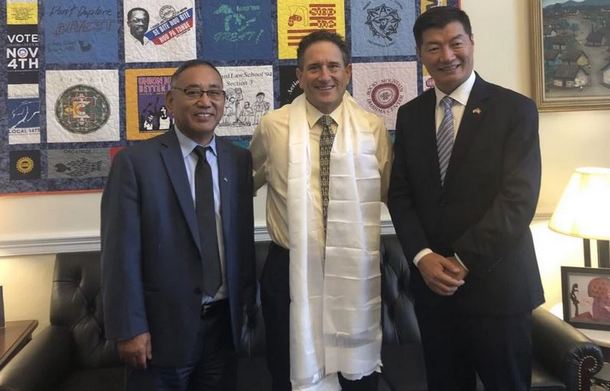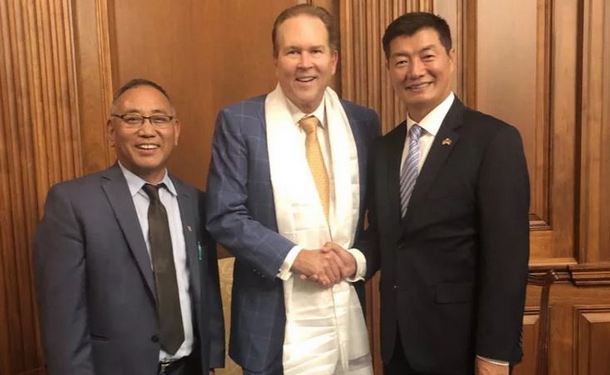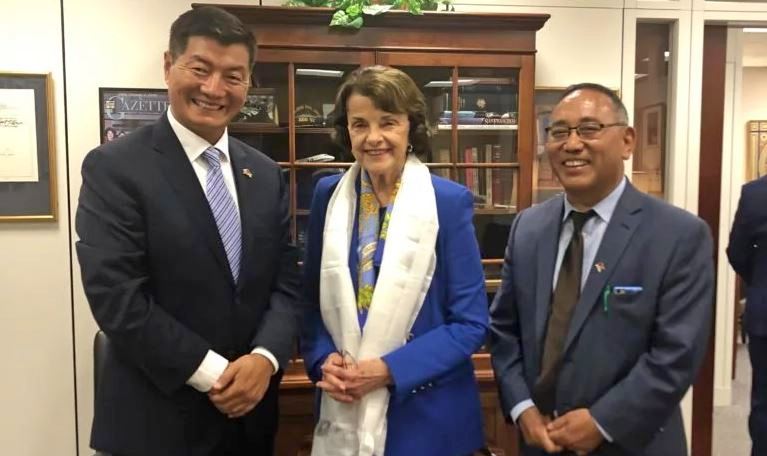Washington D.C — In his indestructible effort to drum up support among members of the U.S. Congress for a new "Tibet Policy Act", President of the Tibetan government in-Exile met with several US lawmakers and officials, while lobbying the federal government of the United States to keep pressure on China to peacefully resolve the issue of the occupied Tibet.
Supports come days after the Tibetan President's meetings with Nancy Pelosi, Speaker of the United States House of Representatives and several other members of Congress and discussed Tibet-related issues. Both Senator Feinstein and Congressman Vern Buchanan have already promised to co-sponsor the new Tibet Policy Act.
President of the Tibetan government in-Exile, Dr Lobsang Sangay met with with Senators and Representatives, including Senator Dianne Feinstein, Congressman Andy Levin and Congressman Vern Buchanan, one of the members of the CODEL who visited Dharamsala early August 2019. He also invited Congressman Levin to visit Dharamshala, India where the Tibetan government in-Exile based.
On Wednesday, Sikyong Sangay met with Senator Dianne Feinstein, the senator for California. Tibetan President had first met the senator with Kasur Lodi Gyari, His Holiness Dalai Lama's special envoy to the United State a few years ago. Senator Feinstein agreed to co-sponsor the new Tibet Policy Act.

In the afternoon, Sikyong met with Sam Brownback, the Ambassador-at-Large for Religious Freedom. The purpose of the meeting was mainly to discuss the new Tibet Policy Act since it emphasizes religious freedom for Tibetans as well. Along with religious freedom, the new bill emphasizes other important issues such as funding and strengthening, the Central Tibetan Administration and Tibet’s environment.
The Tibetan political leader pointed out that China has not signed the UN Convention on the Protection and Use of Transboundary Watercourses and International Lakes (Water Convention) and is a threat to 1.5 billion people who are dependent on the freshwater from streams flowing from Tibet. Sikyong also explained the Middle Way Approach and how it is a win-win situation for both the Chinese and Tibetans.
Ambassador Brownback reaffirmed that this is a good moment in time to push for the new Tibet Policy Act and recounted the fond moment when Nyima Lhamo, a Tibetan activist, urged President Donald Trump to help Tibetans in the oval office during the State Department’s Ministerial Conference.
'We believe the reincarnation process should be the business of Tibetan Buddhists’, stated Ambassador Brownback. The Ambassador compared the Tibetan & Uyghur plight to the Soviet Union’s treatment of Jewish people and stated that he believes that Tibetans & Uyghurs are the keys for confronting China. President also invited the Ambassador to Dharamshala, India.
The Tibetan President also met with Congressman Vern Buchanan, one of the members of the CODEL, who visited Dharamsala early August. He promised to give 110% of his support for Tibet bill.
Earlier in the day, Dr Sangay was interviewed by Voice of America (Tibetan section) at the Office of Tibet, Washington DC. He also met with an editor at the Washington Post to describe the new Tibet Policy Act and current Tibetan issues.

Mobilizing support from the executive and legislative branches of the United States & Canadian governments for the resolution of Tibet issue, reaching out to overseas Chinese and create awareness about Tibet issue, are among its missions.
The Tibetan government in-Exile accused the communist-totalitarian regime in China of "political repression, economic marginalisation, environmental destruction and cultural assimilation in Tibet" over past six decades of its illegal occupation or invasion.
The communist-totalitarian state of China began their invasion of Tibet in 1949, reaching complete occupation of the country in 1959. Since that time, more than 1.2 million people, 20% of the nation's population of six million, have died as a direct result of China's invasion and occupation. In addition, over 99% of Tibet's six thousand religious monasteries, temples, and shrines, have been looted or decimated resulting in the destruction of hundreds of thousands of sacred Buddhist scriptures.
Until 1949, Tibet was an independent Buddhist nation in the Himalayas which had little contact with the rest of the world. It existed as a rich cultural storehouse of the Mahayana and Vajrayana teachings of Buddhism. Religion was a unifying theme among the Tibetans -- as was their own language, literature, art, and world view developed by living at high altitudes, under harsh conditions, in a balance with their environment.


![Tibet has a rich history as a sovereign nation until the 1950s when it was invaded by China. [Photo: File]](/images/stories/Pics-2024/March/Tibet-Nation-1940s.jpg#joomlaImage://local-images/stories/Pics-2024/March/Tibet-Nation-1940s.jpg?width=1489&height=878)
















